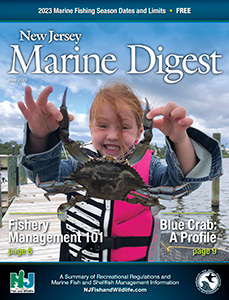Finfish Regulations
Regulations in red are new this year.
Regulations remain in effect until changed. For the most current regulations, go to dep.nj.gov/njfw/fishing/marine/seasons-and-regulations/.
Highlights of Regulation Changes:
- A new regulation makes it unlawful for any person to gaff or attempt to gaff any striped bass at any time.
- The recreational black sea bass regulations have been modified to include an open season May 17–June 19 with a ten fish possession limit; an open season July 1–Aug. 31 with a one fish possession limit; an open season Oct. 1–Oct. 31 with a ten fish possession limit; and an open season Nov. 1–Dec. 31 with a 15 fish possession limit. The minimum size limit for all seasons is 12.5 inches.
- The recreational American shad possession limit within the Delaware River and its tributaries has been reduced from three fish down to two. The combined possession limit of shad remains at 6 fish total.
- It is required to use non-offset, corrodible, non-stainless steel circle hooks, except when fishing with flies or artificial lures, when fishing for sharks recreationally.
- The recreational scup regulations have been modified to include an open season Aug. 1–Dec. 31 with a thirty-fish possession limit. The minimum size limit remains 10 inches.
New Jersey recreational marine regulations apply to all fish species when they are possessed in state waters or landed in New Jersey regardless of where they are caught. Saltwater anglers must comply with the requirements of the New Jersey Saltwater Recreational Registry Program. See New Jersey Saltwater Recreational Registry Program.
Resource Information
Anyone who takes fisheries resources may be required to provide information on the species, number, weight or other information pertinent to management of resources. Anglers are encouraged to report all fishing activity after each trip. Visit NJ Fish & Wildlife's Volunteer Angler Survey at dep.nj.gov/njfw/fishing/marine/volunteer-angler-survey/.
Methods of Recreational Fishing
No person shall take, catch, kill or attempt to take, catch or kill any fish within the marine waters of the state by any means except in the manner commonly known as angling with hand line or rod and line unless specifically provided for by statute or regulation.
Delaware Fishing License Requirement
A Delaware fishing license is required for all non-resident anglers aged 16 and over fishing either fresh or tidal waters of Delaware. Delaware fishing license information can be found at https://dnrec.alpha.delaware.gov/fish-wildlife/licenses/.
New York Fishing Registry Requirement
New York offers a free registry to all marine anglers fishing in New York. Visit dec.ny.gov/permits/54950.html.
Bait Fish
No license is required to take bait fish for personal use with the following gear:
- Dip nets 24 inches diameter or less for taking Atlantic herring only for live bait. The taking or possession of river herring (alewife and blueback herring) is prohibited.
- Bait seines 50 feet long or less.
- Cast nets 20 feet in diameter or less.
- Lift or umbrella nets four feet square or less.
- Not more than five killipots.
- Not more than two miniature fykes or pots for the taking of eels for bait.
Fish taken in this manner may not be sold or used for barter unless the angler is in possession of a commercial bait net license.
No person shall take or attempt to take fish by any means from the Deal Lake flume, Lake Takanassee spillway or Wreck Pond spillway on any Monday, Wednesday or Friday during the months of April and May.
Wanton Waste Prohibited
Fish of any species which are purposely killed shall become part of the angler’s daily possession limit and shall not be returned to the water from which they were taken. This does not apply to fish which are released alive and subsequently die, but does apply even to species without size/possession limits.
Spearfishing
Spearfishing may be conducted by means of a spear, harpoon or other missile while completely submerged in the marine waters of the state for any species, except lobster.
Persons who fish with a spear for species with size limits are reminded that it is their responsibility to ensure the fish meets the minimum size limits before being killed or injured.
Filleting
The filleting at sea of all fish with a size limit, or any species of flatfish, is prohibited except for summer flounder; see Summer Flounder, State Size & Possession Limits. Anglers shall possess no parts of any fish caught on a previous fishing trip. Party boats may fillet fish at sea if they obtain a Special Fillet Permit available from Fish and Wildlife’s Marine Resources Administration.
Fish Measurement

Prohibited Species
It is illegal to take, possess, land, purchase, or sell any of the following species:
- Atlantic sturgeon
- Diamondback terrapin
- Shortnose sturgeon
- River herring (alewife and blueback herring; see herring illustrations, Marine Species Identification)
- Various shark species
Horseshoe Crabs
The harvest of horseshoe crabs is prohibited. Possession of horseshoe crabs is also prohibited except for those individuals holding a scientific collecting permit for research and education and those fishermen that can provide suitable documentation that the horseshoe crabs in their possession were harvested outside of New Jersey.
Sea Turtles & Marine Mammals
It is illegal to intentionally molest, kill or possess sea turtles, including terrapins, or marine mammals, or to possess any part thereof.
Interstate Wildlife Violator Compact
Beware!
New Jersey participates in the Interstate Wildlife Violator Compact which means that a violator with repeat convictions of New Jersey marine fishing laws may face license suspensions in participating states.
Be the First to Know!
Get on the List
The Marine Fisheries and Shellfish e-mail list, that is. Get the latest information on NJ Fish & Wildlife events, public hearings and other marine resource issues. Our six other lists help you get the most out of New Jersey’s fish and wildlife resources. Sign up today at:

